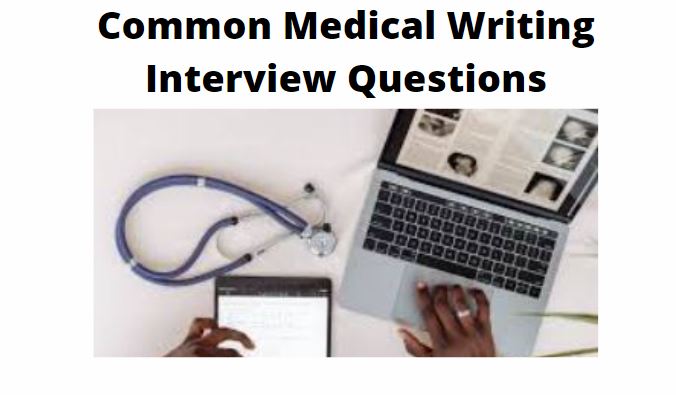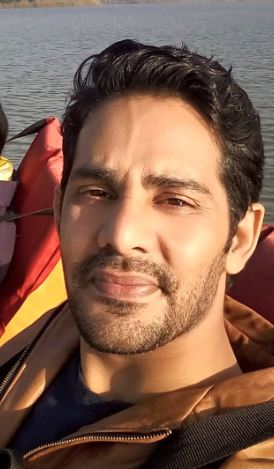The medical writing field has vast opportunities for medical science graduates. To prepare literature, brochures, and medical data, generally, pharmaceutical companies, contract research, regulatory service providers, medical communication, publishing, medical or scientific, hospitals, and academic institutions employ medical writers. So based on that our expert prepared a list of Common Medical Writing Interview Questions with answers.

List of Medical Writing Questions and Answers:
Q: What is Medical writing?
Ans: Medical writing is the act of producing documents relating to various scientific and clinical aspects, by one writer who in almost all probabilities is not a scientist or a physician in any of the research projects. Medical writing communicates complex medical data in a clear, concise, credible, complete, and compelling manner.
Q. What are the role and responsibilities of a medical writer
Ans: Medical writers communicate scientific and medical data to various audiences, ranging from the general public to doctors and academics. A medical writer can create various content journals, news articles, brochures, and blogs for purposes of education and information.
Q: Existence of Medical writing?
Ans: Recognition by the industry for requirements of the unique skill to produce well-structured documents that present information clearly and concisely.
Complex trial procedures are tedious and lengthy till they lead to market approval and this demands the well-written. standard compliant with documents that medical and scientific professionals can easily and quickly read and understand.
Q: What are the challenges of medical writers?
Ans: The challenges for them are as follows:
- The complexity of the data
- Scarcity of Data
- Copywrite issues and Plagiarism
- Target audiences
- Presentation and interpretation of data.
- Updating with the current regulations/ technical aspects.
- Language constraints
- Meeting the expectations
- Co-ordinating with multiple stakeholders
- Communication
Q: What are the different types of medical writing?
Ans: There are six different types of medical writing:
- Regulatory medical writing
- Educational medical writing
- Scientific publications
- Health communications
- Promotional writing
- Grantsmanship
Q: What are the types of documents?
Ans: Patient and clinical study reports are prepared according to regulations Clinical Writing: Protocols, CSRs, CSR shells, TLS, IBs, ICFs, and CRFs.
Regulatory Writing: CO, CS, Justification documents, Briefing documents, ISE, and ISS.
Non-clinical writing: NCO, NCS, Exposure calculation, protocols, and study reports.
Safety writing: PSURs, PBRERs, DSURs, RMPs, SARs, CASRs, PEDERs, ICSRs, and Narratives.
Q: What is regulatory medical writing?
Ans: Medical writing that involves documentation that regulatory agencies require for the approval process for drugs, devices,s, and biologics is termed regulatory writing.
For examples:
- Clinical study reports
- Clinical study protocols
- Patient ICF etc.
Q: Prerequisites for medical writing?
Ans:
- Familiarity with medical concepts and terminology.
- An academic qualification (medicine, pharmacy, biomedical sciences)
- Ability to write
- Adaptability to communicate scientific information to the target audience.
- Some degree of command over the language
- Ability to create and articulate ideas concisely.
Q: What is educational medical writing?
Ans: Medical writing involves writing documents about drugs, devices, and biologics for general audiences and for scientific audiences such as health care professionals for easy referral and understanding. such writing is called educational medical writing.
Q: What is the need for medical writing?
Ans:
- Communalism
- Universalism
- Disinterestedness
- Organized skepticism
- Common ownership of scientific discoveries.
- evaluation using universal, unbiased criteria.
- Scientists should act selflessly
- Ideas are tested and subjected to rigorous, structured scrutiny by peers.
Q: What skill is required for medical writing?
Ans:
- Attention to detail
- Excellent writing skill
- Interpersonal skills
- Organizational skills
- Scientific and teamwork.
Q: Where are the duties performed by medical writers?
Ans: Preparing the range of documents for concerned regulatory submissions including protocols and final reports for clinical trials and clinical expert reports.
It is involved in the preparation of manuscripts for publication in medical journals.
CROs conduct clinical studies and help pharmaceutical companies get their products registered with internal regulatory authorities.
Q: Tell us about any medical writing organization you know.
Ans: Australian Medical Writers Association (AMWA)
Americal Medical Writers Association (AMWA)
European Medical Writers Association (EMWA)
Indian Medical Writers Association (IMWA)
Q: What is your weakness in the medical writing profession?
Ans: You have to answer this in an honest way, but it should be in a positive way.
Not a weakness, but rather a weakness that is advantageous for the job. like, concentrating too much on the details This type of response demonstrates that you are concerned with the quality and are making an effort to keep things in balance.
some more positive answers can be having trouble saying no to work.
Get impatient projects run beyond a deadline. you are a workaholic means a negative thing that is positive for work.
Q: How do you prioritize work?
Ans: The interviewer is interested in learning how you manage obligations and distinguish between high- and low-priority work.
How do you prioritize your job if you have to? To begin checking off tasks on a list. Making a list of all the tasks you have been given demonstrates your ability to operate efficiently.
Related Topic: Medical Coding Interview Questions with Answer Series
Medical Writing Interview Questions Based on Skill
Q: Do you like to work independently or with others?
Ans: These types of questions are asked to test your adaptability.
Q: Where do you see yourself five years from now?
Ans: To check your long-term relationship with a new organization.
Q: How do you incorporate feedback into your work?
Ans: To check your positive attitude.
Q: Have any of your articles been published?
Ans: This question opens the window for your interest areas and the work done by you. Try to answer honestly for the number of articles published.
Q: What is proofreading?
Ans: The field of scientific publication and communications relies heavily on medical writers and editors.
even though performing the tasks may differ, certain attributes are possessed by all the medical writers and editors, for example, knowledge of English as a first language and accuracy.
The ability to proofread and edit content to a high degree is a key component of many writing and editing positions. Proofreading is the ability to identify and remove mistakes such as grammatical, spelling, or formatting errors.
Q: What is the role of the medical writer in the pharma industry?
Ans: As a medical writer produce structured documents that depict information in a clear and concise manner in relation to pharma and research organization. medical writers in the pharma industries can be classified as regulatory medical writers or education medical writers.
Q: Name any language editing software.
Ans: For any medical writer or content writer language editing software is necessary and one of the best software is Grammarly.
Related Topic: Pharmacy Technician Interview Questions and Answers
Q: What do you know about the drug development process?
Ans: Drug development is defined as a process in which a new pharmaceutical drug is concocted and developed. it consists of the following stages and you may also describe in brief the same.
Step 1= Discovery and the development
Step 2= Preclinical Research
Step 3= Clinical research
Step 4= FDA drug review
Step 5= Post-marketing drug safety monitoring
Q. How do you apply ISO-9001 for medical writing?
Ans: ISO-9001 is not a product standard but it distinguishes guidelines, a process, and a quality system of which performance will produce a product meeting customer satisfaction. The medical devices have to follow ISO-13485. It is the international standard for QMS activities that established requirements for the medical device industry.
Q. What is the alternative name of ICH Guidelines?
Ans: E6
Q. Which ICH Guidelines do we refer for details related to design and structure of clinical study report?
Ans: E3
Q. What does “S” stand in provision of Q, S, M, E ICH Guidelines
Ans: Safty
Q. On which disease James Lind conduct Clinical trials
Ans: Scurvy
Q. Which Hypothesis should be tested in statistics
Ans: Null
Q. While interpreting box and whisker plot what does the middle line in the box indicate
Ans: Medium
Q. Which terminology we are using to check flatness of curve in a frequency distribution curve
Ans: Kurtosis
Q. Which statistical test will you use if the number of groups/arms is more than two in your research/Trial?
Ans: Anova
Q. If you reject the null hypothesis when null hypothesis is true, then which type of error it is?
Ans: Type 1 error
Q. Which scale of measurement will you use for the size of shirts which are small, medium, large, and ex-large
Ans: Ordinal
Q. All laboratory parameters follow which scale of measurement?
Ans: Ratio
Q. Which are the countries involved in tri-partite agreement in ICH guidelines
Ans: USA, Europe, and Japan
Q. Which is best statistical plot is used for survival analysis study
Ans: Kaplan-Meir Plots
Q. Who is responsible for writing/creating a statistical analysis plan (SAP)?
Ans: Biosatatistician
Q. What are the documents required to write a CSR?
Ans: Protocol, CSR template, SAP, and TLFs
Q. After which phase of clinical trial new drug application (NDA) is submitted to the regulatory body?
Ans: Phase 3
Q. Soon after the preclinical trials, if the sponsor wants to initiate first in human trials, the sponsor needs to submit which application to the regulatory bodies.
Ans: Investigational new drug application.
Q. What is the non-probability type of sampling?
Ans: Quota sampling
Q. If the clinical study is prematurely discontinued/terminated; which type of CSR should be written?
Ans: Abbreviated clinical study report.
Q. What kind of those populations were all subjects who have successfully completed all visits and did not substantially deviate from the protocol as determined by the trial cohort review committee prior to database hard lock?
Ans: Pre-Protocol population.
Note: The Medical Writing Interview Questions list be updated from time to time, so kindly visit frequently to check the latest questions.

Naresh Bhakar is the Founder and Author at Pharmaguddu.com, bringing his extensive expertise in the field of pharmaceuticals to readers worldwide. He has experience in Pharma manufacturing and has worked with top Pharmaceuticals. He has rich knowledge and provides valuable insights and data through his articles and content on Pharmaguddu.com. For further inquiries or collaborations, please don’t hesitate to reach out via email at [email protected].
